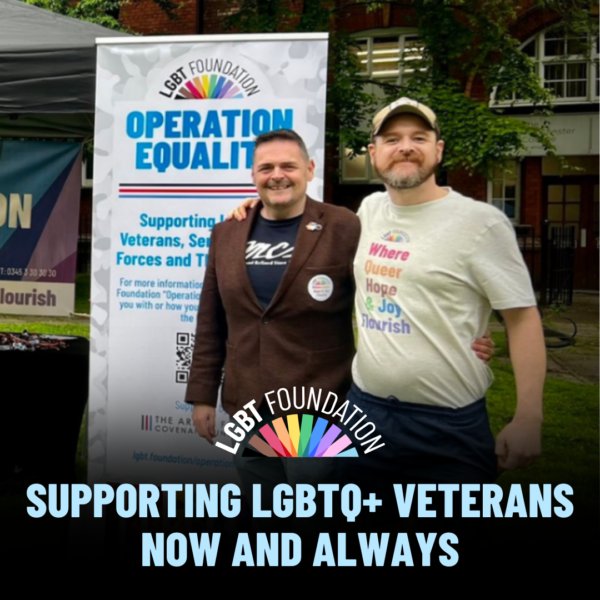Commemorative Dates Stories

Please note, this post is a personal reflection on discrimination and threats faced by an LGBT member of the armed forces. If you are affected by the issues present and need support, reach out to our helpline at 0345 3 30 30 30.
Today marks 25 years since the historic ban on LGBTQ+ people serving in the Armed Forces was lifted.
Ruairi Smith, Programme Manager for Operation Equality & Our Manchester at LGBT Foundation wrote of his own experience serving under the ban:
Before the year 2000, being gay in the Royal Navy was not just a personal struggle but a legal and social battle. The ban on homosexuality meant that LGBT personnel like me, lived under constant fear of persecution. This led to profound impacts on my mental health, social isolation, and self-respect. Imagine living every day with the fear that your true self could lead to your downfall.
For me and many gay personnel in the Armed Forces, this was our harsh reality. The threat of being discovered and subsequently discharged was ever-present. This fear wasn’t just about losing a job, it was about losing our community, a sense of purpose, and a way of life. The mental toil of hiding one’s identity cannot be overstated and sadly, for me, the fear turned in living nightmare.
Many LGBT personnel experienced severe anxiety and depression. The constant need to hide their true selves often led to paranoia. Every interaction scrutinised, and every word carefully chosen to avoid suspicion. The constant checking of oneself and the relentless pressure to be ‘normal’ and conform has often manifested itself into long-term mental health issues.
Isolation is another significant consequence. Forming close bonds with colleagues is a crucial part of military life, but for gay personnel, this was too risky. Trusting someone with their secret could lead to betrayal and severe consequences. As a result, many chose to keep their distance, leading to loneliness and isolation, a behaviour and a feeling of fear that many have taken with them since their service ended.
Being discovered as gay didn’t just mean discharge, it often meant criminal prosecution. Homosexual acts were criminal offenses, leading to court-martials and criminal records. This not only ended military careers but also severely limited future employment opportunities.
In 1999 I was discovered, interrogated and punished all because I was in love with another man. Another person, who like me was living in fear of being ‘found out’. We were both court-martialled and sentenced and never saw each other again.
We were in love.
Love is supposed to be universal. Everyone deserves to experience joy and connection, but for us it was forbidden, illegal and we paid the price. I spent three months in solitary confinement and was ‘Dishonourably Discharged’ with a criminal record. The stigma of my criminal conviction has followed me long after my service has ended. To this very day, the feelings of shame and guilt still haunt me. I have constant sense of letting people down and of failure, when in reality it was me that was failed upon and let down by an institution, a family if you will, that was supposed to take care of me.
Perhaps, the most damaging impact was the loss of self-respect. Being forced to hide who we are, has led many people to internalise the negative belief that society has of them. This internalised homophobia has eroded self-esteem and self-worth, making it difficult to maintain any sense of pride or dignity and in most cases building and maintaining meaningful relationships with partners, family or friends.
The lifting of the ban on homosexuality in the Armed Forces on, January 12th, 2000 marked a significant step towards equality and acceptance. However, the scars left by years of persecution are still felt by many who lived through those dark times.
I am now actively involved in community and social work with the LGBT Foundation through a project called Operation Equality, as Programme Manager. Funded by the Armed Forces Covenant, this scheme aims to address issues that were caused because of the ban. Through collaborating with other military and support organisations, inviting LGBT Veterans to share their stories and experiences, we are able to help give the well-being support and advice that is needed for those people who cannot access or find help through traditional support networks.
The LGBT Foundation stands in Solidarity with those veterans affected and welcomes the 25th anniversary of the Government’s decision to end the ban on January 12th, 2025.
If this article resonates with you or if you want further information, please visit the Operation Equality programme page or contact our helpline at 0345 3 30 30 30.







